 How To Prevent Sink Blockages In The Future
How To Prevent Sink Blockages In The Future

Sink blockages are a common issue that can cause significant inconvenience and expense for property owners. These blockages can disrupt daily activities and, if not addressed promptly, may lead to costly repairs. Residential properties may experience blockages from everyday household items like food waste and hair, while commercial properties might face blockages due to higher usage volumes and the disposal of more varied waste products.
Impact on Residential and Commercial Properties
The impact of sink blockages extends beyond the immediate inconvenience of a slow-draining sink. In residential settings, blockages can lead to unpleasant odours and the potential for water damage. For commercial properties, such as restaurants or hotels, the implications are more severe, potentially affecting business operations and customer satisfaction.
Financial and Operational Implications
Recurring blockages can have significant financial implications, including the cost of emergency plumbing services and potential loss of business revenue. Additionally, the operational impact of a blocked sink in a commercial environment can disrupt the workflow and lead to health and safety concerns.
Preventive Measures
This guide aims to provide you with a comprehensive understanding of how to prevent future sink blockages. By exploring the causes, early warning signs, and preventive measures, you can take proactive steps to maintain clear and functional drainage systems. The focus is on practical, eco-friendly solutions that align with best practices for property maintenance and management.
Understanding Common Causes of Sink Blockages
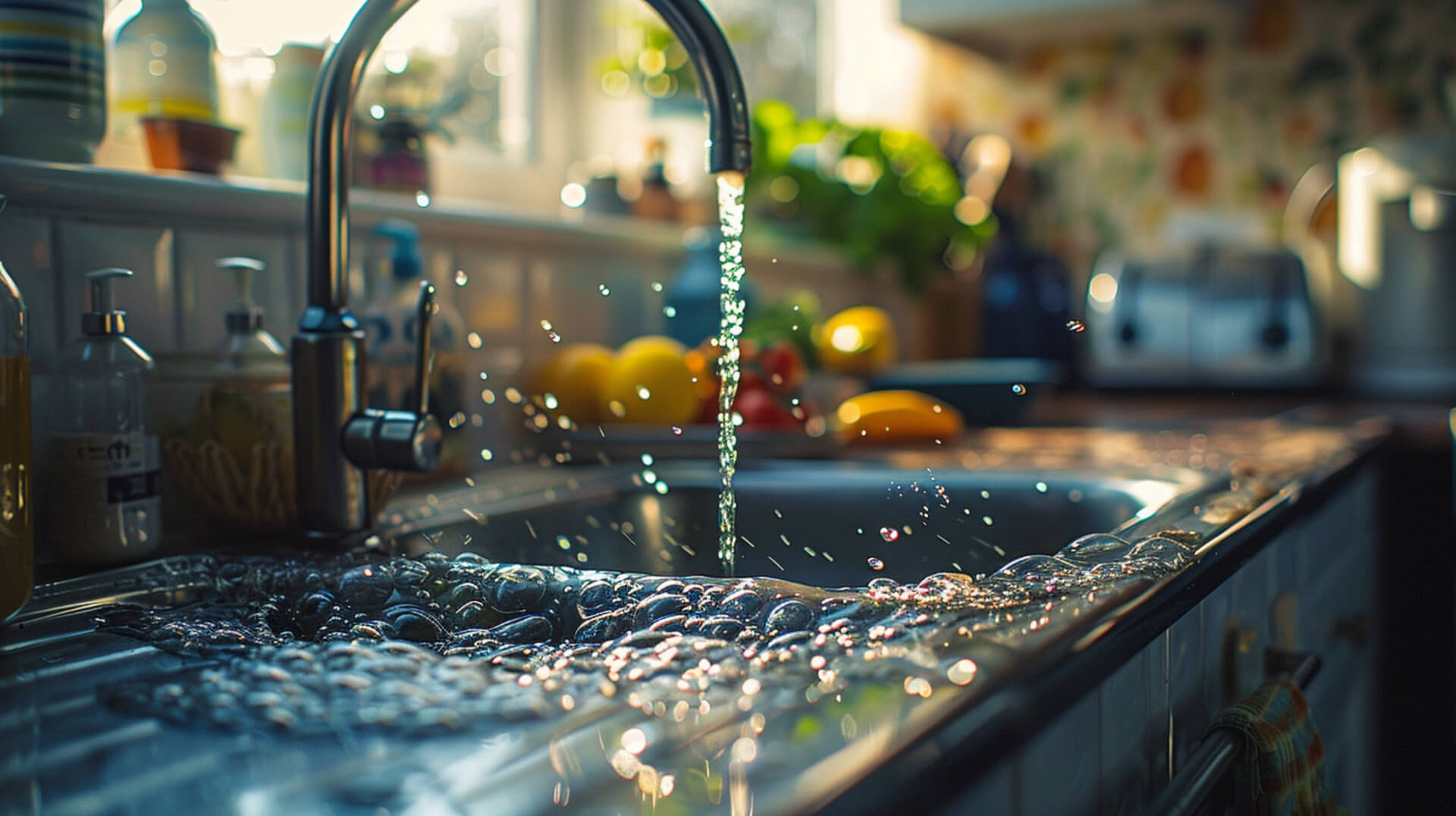
Sink blockages are a prevalent issue that can cause significant inconvenience and expense. Identifying the root causes is essential for effective prevention and resolution.
Substances Leading to Blockages
A variety of materials can contribute to sink blockages:
- Organic Matter: Food scraps, especially fats, oils, and grease (FOG), solidify in pipes, causing clogs.
- Hair and Soap: In bathrooms, hair binds with soap scum, forming dense masses.
- Foreign Objects: Small objects and non-biodegradable items like wipes or feminine hygiene products can obstruct flow.
Impact of Improper Disposal Practices
Improper disposal of waste plays a significant role in blockage formation:
- Kitchen Misuse: Treating the sink as a garbage disposal for food waste and FOG is a common mistake.
- Bathroom Habits: Flushing anything other than human waste and toilet paper can lead to blockages.
Environmental Factors
Environmental elements can also cause blockages:
- Tree Roots: Seeking moisture, tree roots can infiltrate and clog pipes.
- Mineral Buildup: In areas with hard water, mineral deposits can accumulate and narrow pipes.
Importance of Cause Identification
Before implementing a solution, it is crucial to determine the cause of a blockage:
- Effective Solutions: Correctly identifying the cause ensures the most appropriate and effective remedy.
- Prevention Strategies: Understanding the cause informs future prevention strategies, saving time and resources.
By recognising these common culprits and their impact, you can take proactive steps to maintain clear and functional sinks.
Daily Practices for Maintaining Clear Sinks
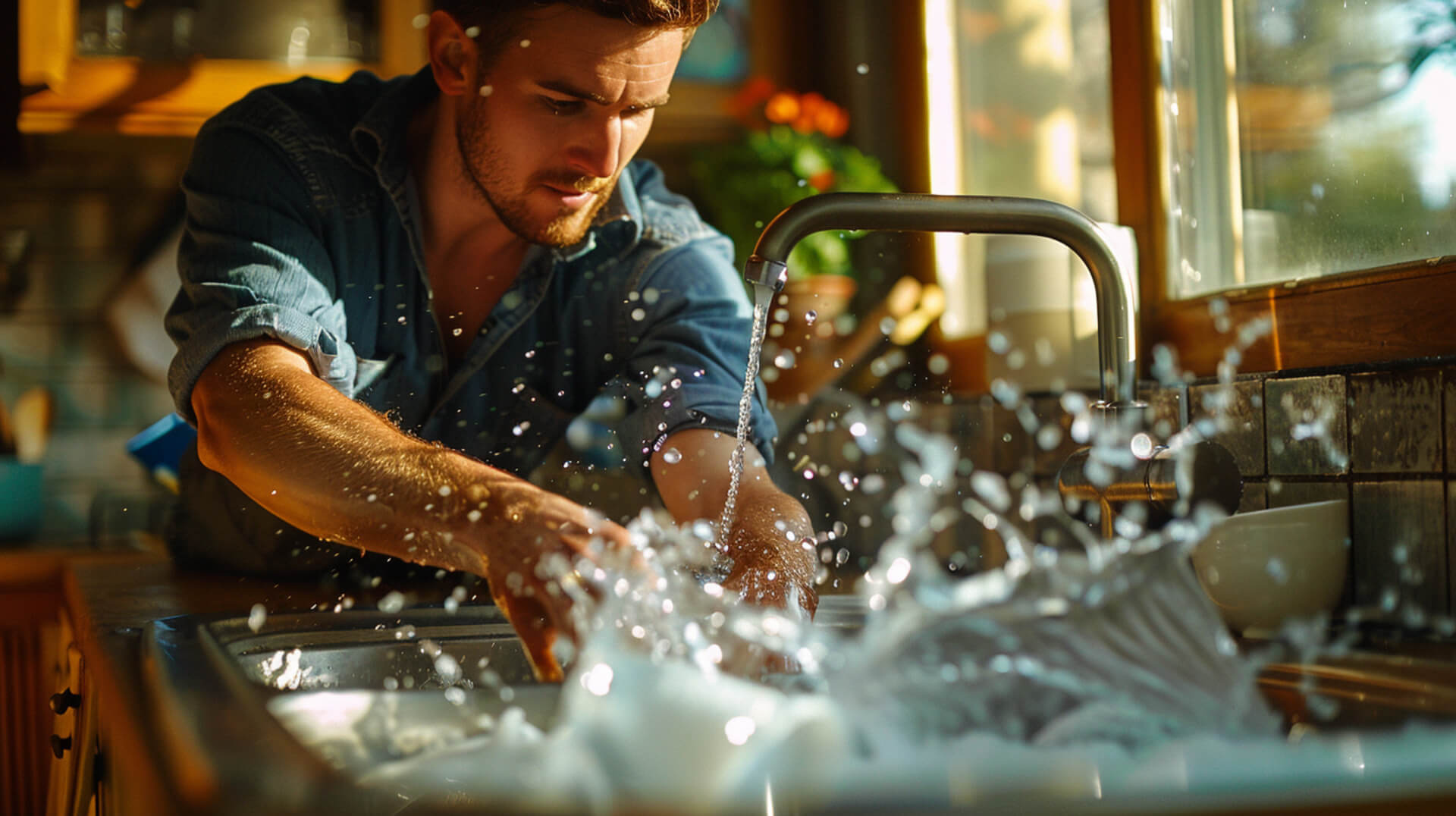
Incorporating simple daily habits can significantly reduce the risk of sink blockages. By understanding and applying these practices, you can maintain clear and functional drains in your property.
Role of Hot Water in Drain Maintenance
Regularly flushing your sinks with hot water serves multiple purposes:
- Dissolves Fats: Hot water helps dissolve oil and grease, preventing solidification in the pipes.
- Clears Soap Residue: It also aids in clearing soap and detergent buildup that can attract other debris.
Items to Avoid in Sinks
Certain items can cause immediate or cumulative blockages and should never be disposed of down the sink:
- Cooking Grease: Solidifies upon cooling and creates stubborn clogs.
- Coffee Grounds: Accumulate over time and can compact, leading to blockages.
- Starchy Foods: Can swell and stick to the pipes, obstructing water flow.
Educating Building Occupants
Informing residents and employees about proper sink usage is crucial:
- Prevention Awareness: Understanding what causes blockages can motivate individuals to avoid harmful disposal habits.
- Best Practices: Sharing best practices for sink use ensures everyone contributes to maintaining clear drains.
By adopting these daily practices and educating those who use the facilities, you can prevent the common causes of sink blockages and maintain a smooth-running drainage system.
The Role of Protective Devices in Blockage Prevention

Protective devices such as strainers and drain guards play a crucial role in preventing sink blockages. By understanding the types available and their functions, you can make informed decisions to safeguard your plumbing system.
Types of Strainers and Protective Devices
Various strainers and protective devices are designed to fit different sinks:
- Mesh Strainers: Capture fine particles and are ideal for kitchen sinks.
- Silicone Strainers: Flexible and easy to clean, suitable for both kitchen and bathroom sinks.
- Stainless Steel Strainers: Durable and rust-resistant, often used in commercial settings.
Functionality of Protective Devices
These devices prevent blockages by:
- Trapping Debris: They catch food particles, hair, and other materials before they enter the drainage system.
- Easy Maintenance: Most strainers can be easily removed and cleaned, making them a practical solution.
Selecting a Protective Device
When choosing a device, consider:
- Size and Fit: Ensure the device fits snugly in your sink to prevent debris from slipping through.
- Material: Choose a material that is durable and easy to clean.
- Design: Some strainers come with handles for easy removal, while others are flush with the sink’s surface.
Maintenance of Protective Devices
Regular cleaning is essential:
- Frequency: Clean the strainers weekly or more often if you notice debris accumulation.
- Replacement: Inspect for wear and tear and replace the devices as needed to ensure continued effectiveness.
By incorporating the right protective devices and maintaining them properly, you can significantly reduce the likelihood of sink blockages.
Eco-Friendly Methods for Preventing Sink Blockages
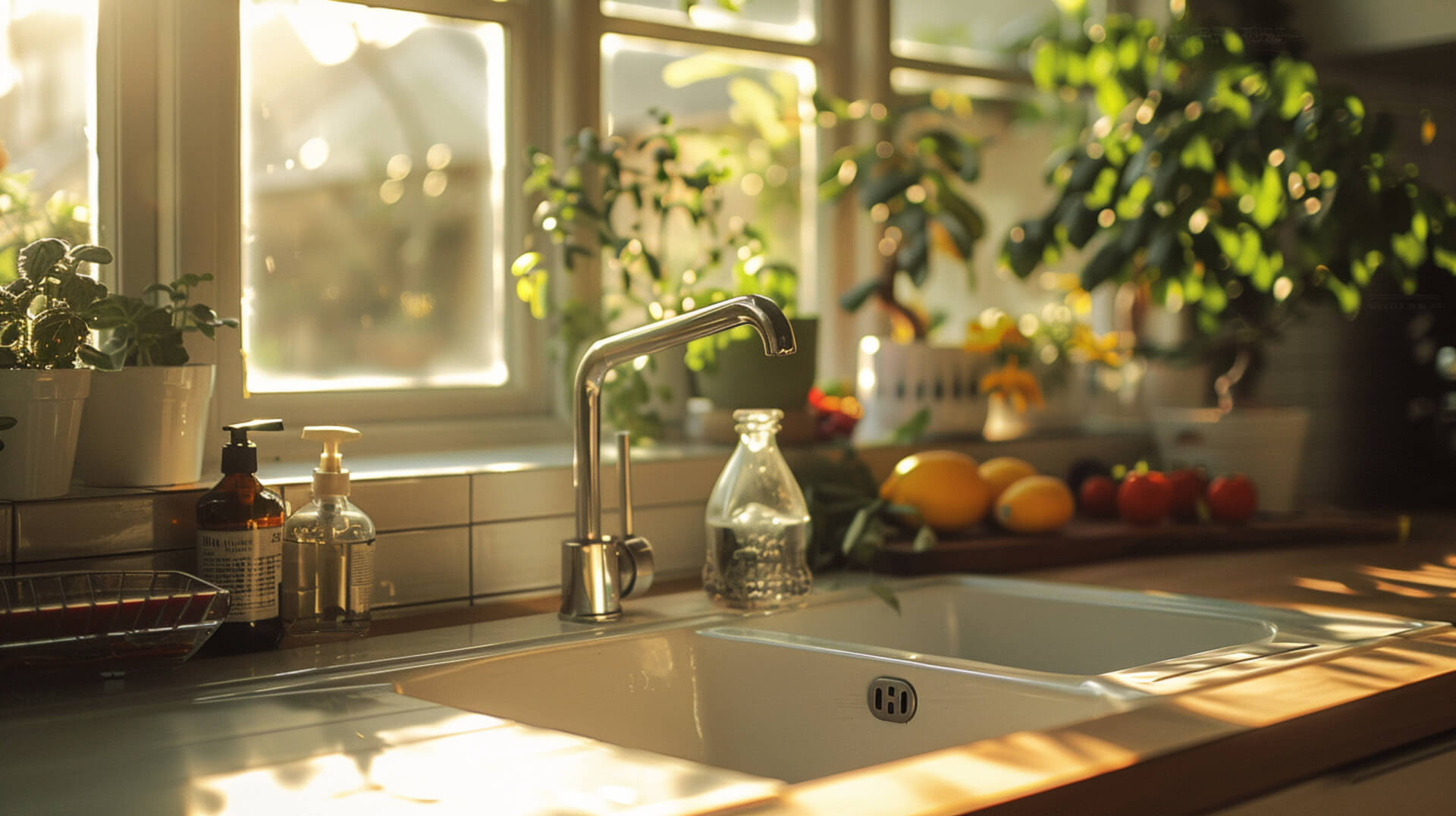
Choosing eco-friendly cleaning methods is not only beneficial for your plumbing but also for the environment. These methods often utilise natural substances that are less harsh than chemical cleaners, reducing the risk of damage to pipes and the ecosystem.
How Enzyme Sticks and Bio-Enzymatic Cleaners Work
Enzyme sticks and bio-enzymatic cleaners are innovative solutions that use natural bacteria to break down organic matter in pipes:
- Enzyme Sticks: These are placed in the drain where they slowly release bacteria that digest organic materials like grease and food particles.
- Bio-Enzymatic Cleaners: These liquid solutions pour into the drain, introducing bacteria that naturally clear blockages without corrosive chemicals.
Benefits of Natural Cleaning Solutions
Natural cleaning solutions such as baking soda and vinegar offer several advantages:
- Non-Toxic: They are safe to use and do not emit harmful fumes.
- Effective: These substances can effectively dislodge and dissolve blockages when used regularly.
- Affordable: Common household items like baking soda and vinegar are cost-effective alternatives to commercial chemical cleaners.
Composting to Reduce Kitchen Sink Blockages
Composting organic waste is a proactive approach to preventing sink blockages:
- Waste Diversion: By composting food scraps, you reduce the amount of waste that goes down the drain.
- Soil Enrichment: Composting turns kitchen waste into nutrient-rich soil, promoting a sustainable cycle.
By adopting these eco-friendly methods, you can maintain clear drains and contribute to environmental conservation.
The Importance of Regular Professional Inspections
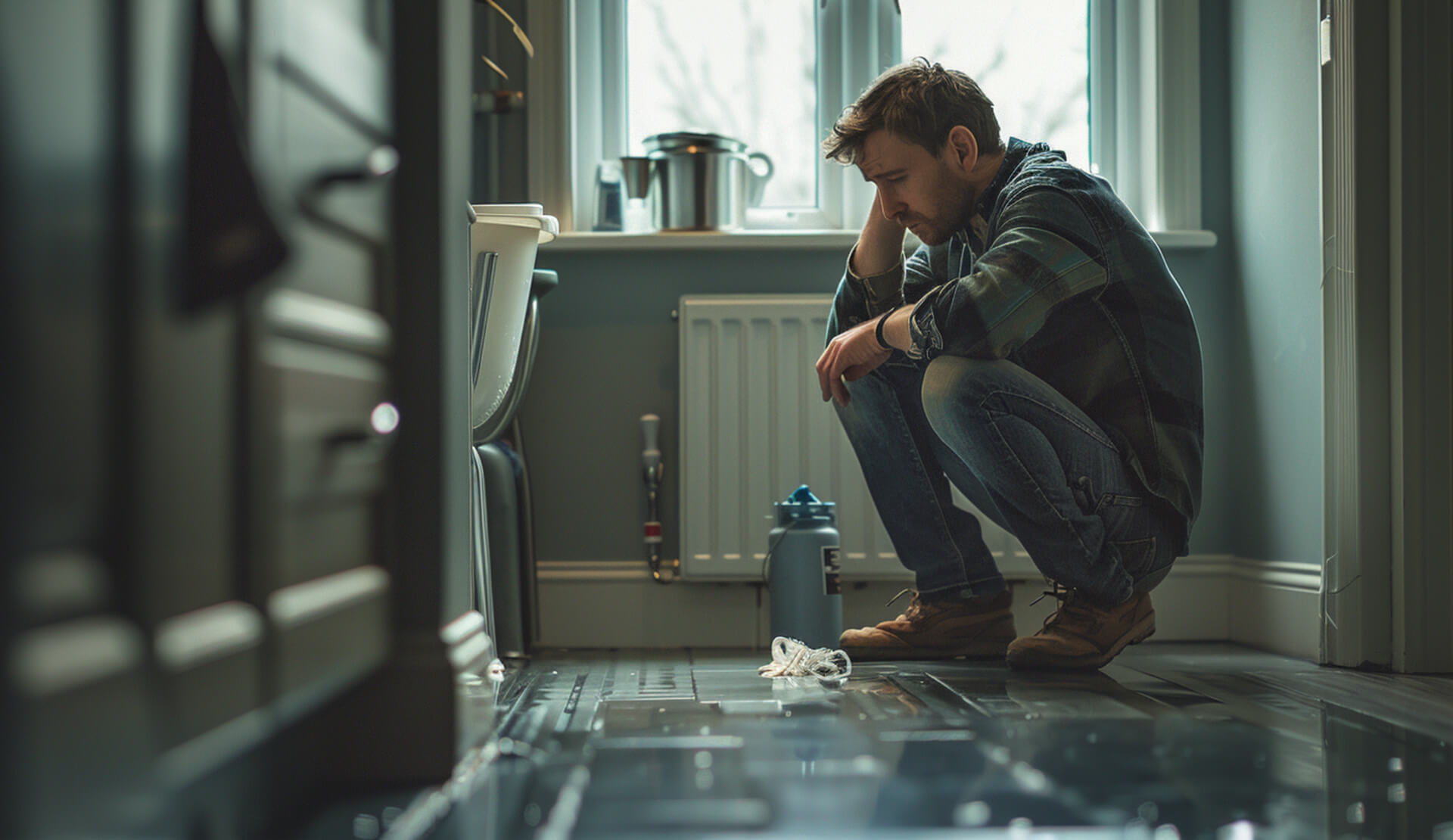
Regular inspections by plumbing professionals are a key component in preventing sink blockages. These inspections can identify potential issues before they escalate into serious problems.
Frequency of Professional Plumbing Inspections
It is recommended that you schedule professional plumbing inspections:
- Annually: As a preventative measure, even if no issues are apparent.
- Biannually: For older plumbing systems or those in areas with hard water.
Focus Areas During Professional Inspections
During an inspection, professionals typically examine:
- Drainage Speed: To detect early signs of clogging.
- Pipe Integrity: Checking for corrosion, damage, or tree root infiltration.
- Water Pressure: To ensure there are no hidden leaks or blockages.
Benefits of Early Professional Intervention
Early detection by a professional can:
- Prevent Severe Blockages: Addressing minor clogs before they become major issues.
- Save Costs: Reducing the need for emergency repairs or extensive damage restoration.
Indicators for a Professional Inspection
You should consider a professional inspection if you notice:
- Recurring Clogs: Frequent blockages that DIY methods do not resolve.
- Unusual Noises: Gurgling sounds from drains can indicate a developing blockage.
- Foul Odours: Persistent sewer smells can be a sign of deeper blockages.
By adhering to a regular inspection schedule and heeding these signs, you can maintain a healthy plumbing system and prevent future sink blockages.
Managing Garbage Disposals to Prevent Blockages
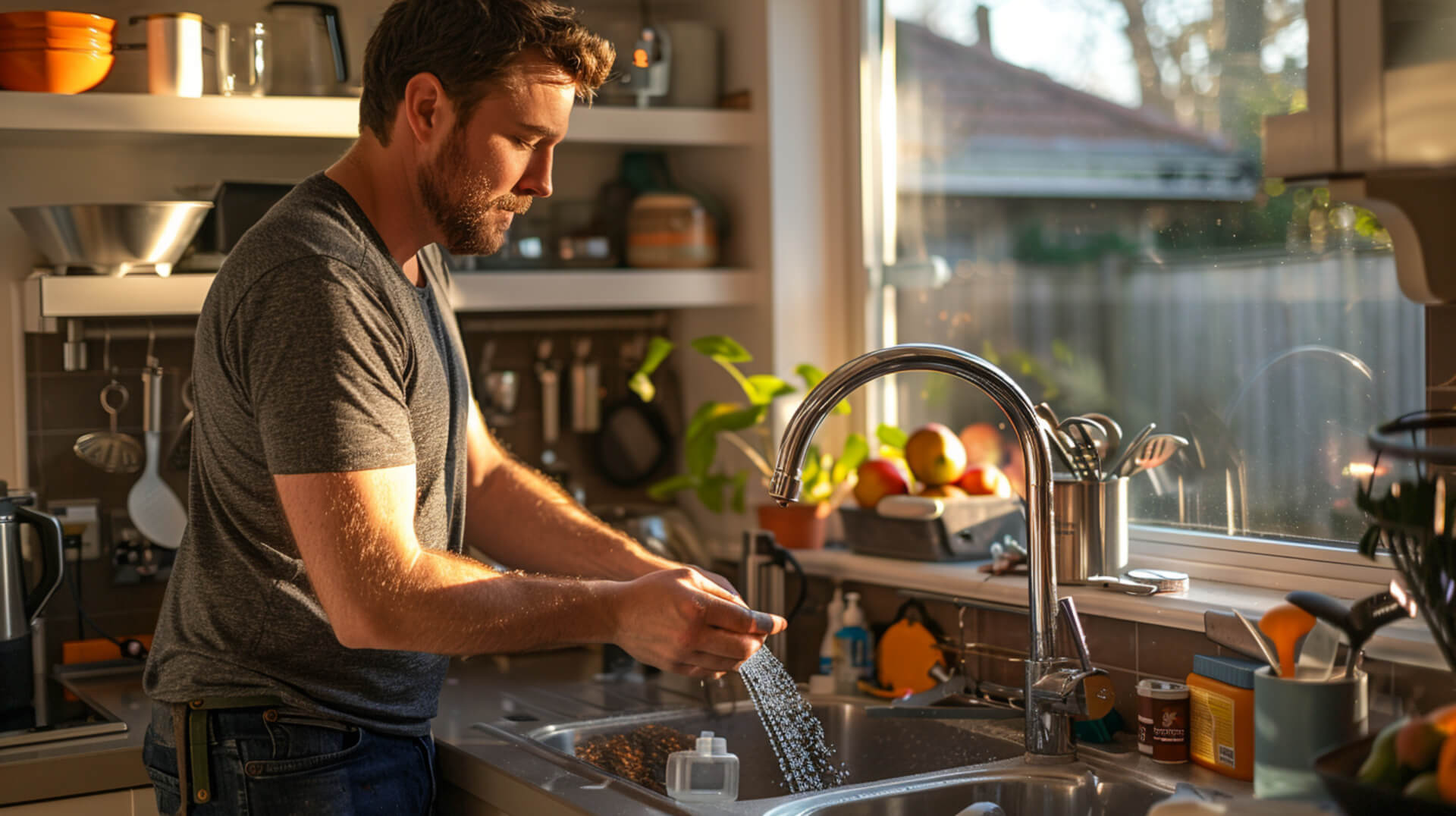
Proper use and maintenance of garbage disposals are essential in preventing sink blockages. Understanding best practices and what to avoid can extend the life of your disposal unit and keep your drains clear.
Best Practices for Garbage Disposal Use
To maintain an efficient garbage disposal:
- Run Cold Water: Always use cold water when grinding food waste to solidify grease and oils, making them easier to chop and flush away.
- Gradual Disposal: Feed waste slowly into the disposal to prevent overloading and clogs.
- Regular Cleaning: Clean your disposal regularly with natural cleaners to prevent odour and buildup.
Harmful Items for Garbage Disposals and Drains
Certain materials can damage your disposal or lead to blockages:
- Expandable Foods: Pasta and rice can expand in the pipes, causing blockages.
- Hard Objects: Bones and fruit pits can dull the blades and jam the unit.
- Non-Food Items: Non-biodegradable items like plastic or metal should never be placed in the disposal.
Preventing Misuse in Communal Settings
In shared environments, clear guidelines can help prevent misuse:
- Signage: Post instructions near the disposal for proper usage.
- Education: Inform users about what can and cannot be disposed of through regular communication.
Maintenance for Garbage Disposal Longevity
Regular maintenance ensures your disposal operates effectively:
- Blade Sharpness: Occasionally grind ice cubes to sharpen the blades.
- Professional Checks: Have a professional inspect the unit annually for any potential issues.
By following these guidelines, you can ensure your garbage disposal aids in preventing sink blockages rather than causing them.
Innovative Products and Solutions for Maintenance
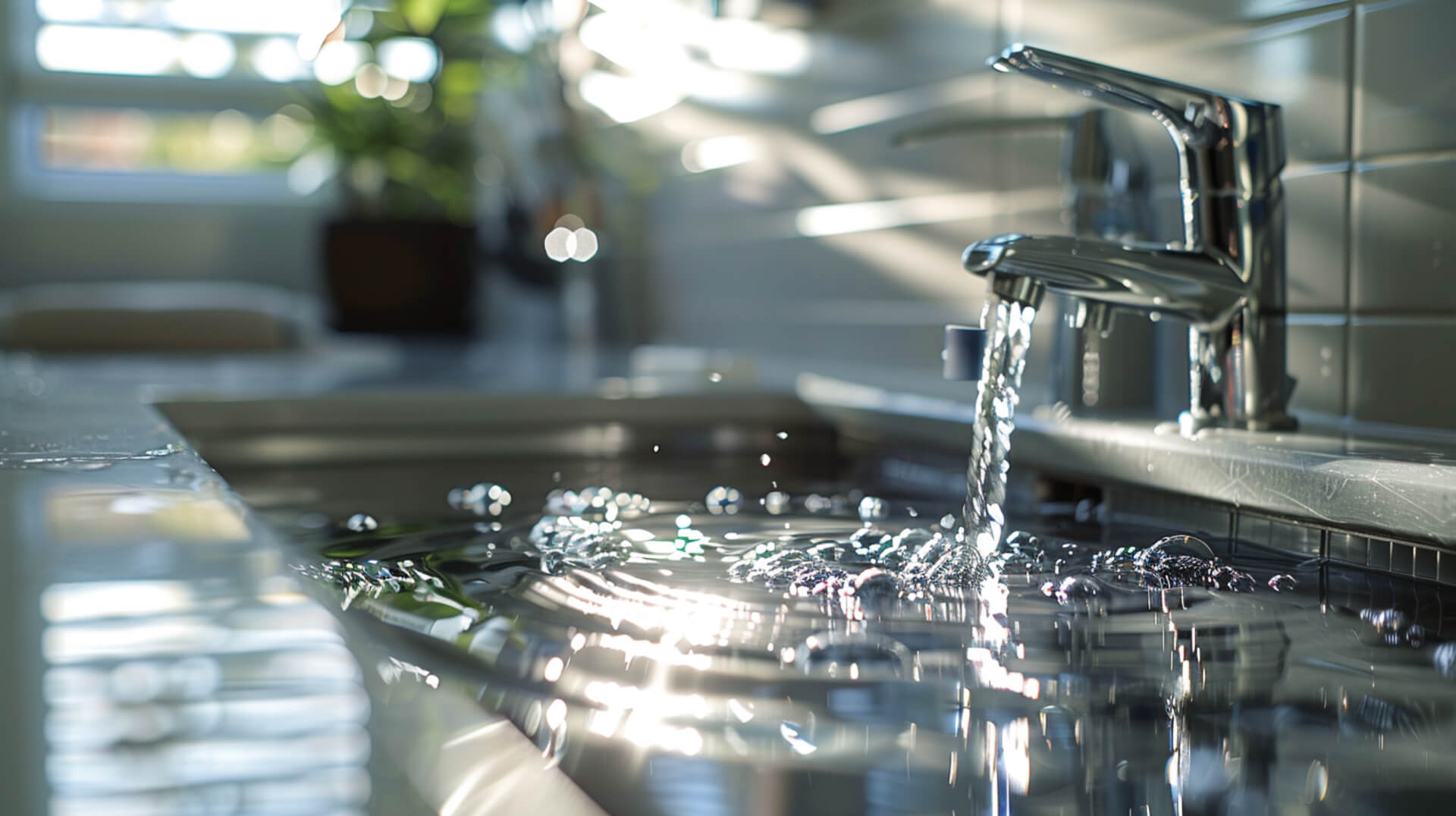
Exploring new products for sink maintenance can provide effective solutions for preventing blockages. These innovative options often offer a blend of convenience and efficiency.
Enzyme Sticks and Their Functionality
Enzyme sticks are a modern alternative to traditional cleaning methods:
- Natural Bacteria: They release bacteria that break down organic matter without harsh chemicals.
- Long-Term Maintenance: Designed for continuous use, they gradually prevent buildup over time.
Advantages of Innovative Maintenance Products
Compared to conventional methods, innovative products offer several benefits:
- Environmental Safety: Many new products are eco-friendly and safe for both the plumbing system and the environment.
- Ease of Use: They are often designed for simplicity, requiring minimal effort from the user.
- Effectiveness: These solutions target the root cause of blockages, providing a long-term preventative measure.
Evaluating Product Effectiveness
Property owners can assess the effectiveness of these products through:
- User Reviews: Reading feedback from other consumers can provide real-world insights.
- Professional Recommendations: Plumbers and industry experts can offer advice based on experience.
- Trial and Observation: Testing a product and observing its impact over time is a direct method of evaluation.
By considering these innovative products, you can enhance your maintenance routine and prevent future sink blockages.
Financial Considerations: Insurance and Cost Savings

Regular maintenance and proactive prevention strategies can have a positive impact on your property insurance premiums and overall long-term maintenance costs.
Influence on Insurance Premiums
By demonstrating diligent maintenance, you may be able to negotiate lower insurance premiums:
- Risk Mitigation: Regular upkeep reduces the likelihood of severe plumbing issues, which can be favourable in the eyes of insurers.
- Documentation: Keeping a record of maintenance can serve as evidence of risk management, potentially influencing premium calculations.
Coverage of Plumbing Issues by Insurance
Property insurance typically covers sudden and accidental damage but may not cover all plumbing issues:
- Standard Policies: Generally cover water damage from burst pipes but not damages from gradual wear and tear.
- Additional Coverage: Some insurers offer endorsements for sewer backups or sump pump failures, which might be worth considering.
Reduction of Long-Term Maintenance Costs
Preventive measures can significantly reduce the need for costly repairs:
- Avoiding Major Repairs: Regular cleaning and inspections can prevent blockages that lead to expensive emergency plumbing services.
- Extending Lifespan: Proper disposal practices and the use of protective devices can prolong the life of your plumbing system.
Financial Benefits of Blockage Prevention
Investing in blockage prevention measures can yield financial benefits:
- Operational Efficiency: Ensuring that your plumbing system is functioning properly avoids disruptions to your daily activities or business operations.
- Cost Avoidance: By preventing blockages, you avoid the costs associated with clearing severe clogs and repairing any resulting damage.
By considering these financial aspects, you can make informed decisions that protect both your property and your wallet.
Environmental Considerations in Blockage Prevention

Environmental sustainability is a critical aspect of residential and commercial property maintenance. When preventing sink blockages, the methods chosen can have a significant impact on the environment.
Impact of Chemical Cleaners on Plumbing and Environment
Chemical cleaners may provide a quick fix for blockages but can have long-term detrimental effects:
- Pipe Corrosion: Harsh chemicals can deteriorate plumbing over time, leading to leaks and the need for premature pipe replacement.
- Environmental Harm: These substances can contaminate water sources, harm aquatic life, and disrupt ecosystems when they enter the sewage system.
Advantages of Eco-Friendly Cleaning Methods
Environmentally friendly cleaning methods offer several benefits:
- Safety: They are typically non-toxic, posing less risk to household members and wildlife.
- Biodegradability: Natural cleaners break down more easily in the environment, reducing pollution.
- Effectiveness: Many eco-friendly options are just as effective as their chemical counterparts when used correctly.
Contribution of Proper Waste Disposal to Environmental Sustainability
Proper waste disposal is integral to environmental conservation:
- Reduced Contamination: By composting organic waste and disposing of hazardous materials properly, you prevent harmful substances from entering the drainage system.
- Resource Conservation: Minimising waste sent down the drain conserves water and reduces the burden on sewage treatment facilities.
By considering these environmental factors, you can choose blockage prevention methods that are effective and responsible, contributing to the overall sustainability of your property’s maintenance practices.
Outdoor Maintenance to Prevent Indoor Sink Blockages

Proper outdoor maintenance is a critical but often overlooked factor in preventing indoor sink blockages. By keeping external areas clean and clear, you can mitigate the risk of debris entering and clogging your indoor plumbing system.
Regularly Maintained Outdoor Areas
Focus on maintaining these outdoor areas to prevent blockages:
- Gutters and Downspouts: Ensure they are free of leaves and debris to prevent overflow and subsequent seepage into foundation drains.
- Yard Drains: Keep yard drains clear of leaves, twigs, and other garden waste to maintain proper drainage away from the property.
Contribution of Leaves and Debris to Blockages
Leaves and debris can cause blockages in outdoor drainage systems by:
- Obstructing Water Flow: Accumulated waste can block water flow, leading to backups and potential indoor plumbing issues.
- Decomposing Material: As leaves and debris decompose, they can form a sludge that is difficult to clear and may enter indoor pipes.
Preventive Measures for Outdoor Drains
To protect outdoor drains:
- Regular Cleaning: Schedule routine cleaning of gutters and outdoor drains, especially after storms or during fall.
- Installing Guards: Use gutter guards and drain covers to prevent debris from entering the drainage system.
- Proper Disposal: Dispose of garden waste appropriately to prevent it from washing into drains.
By attending to these outdoor maintenance tasks, you can play a significant role in safeguarding your indoor plumbing against blockages.
Proactive Approach to Blockage Prevention
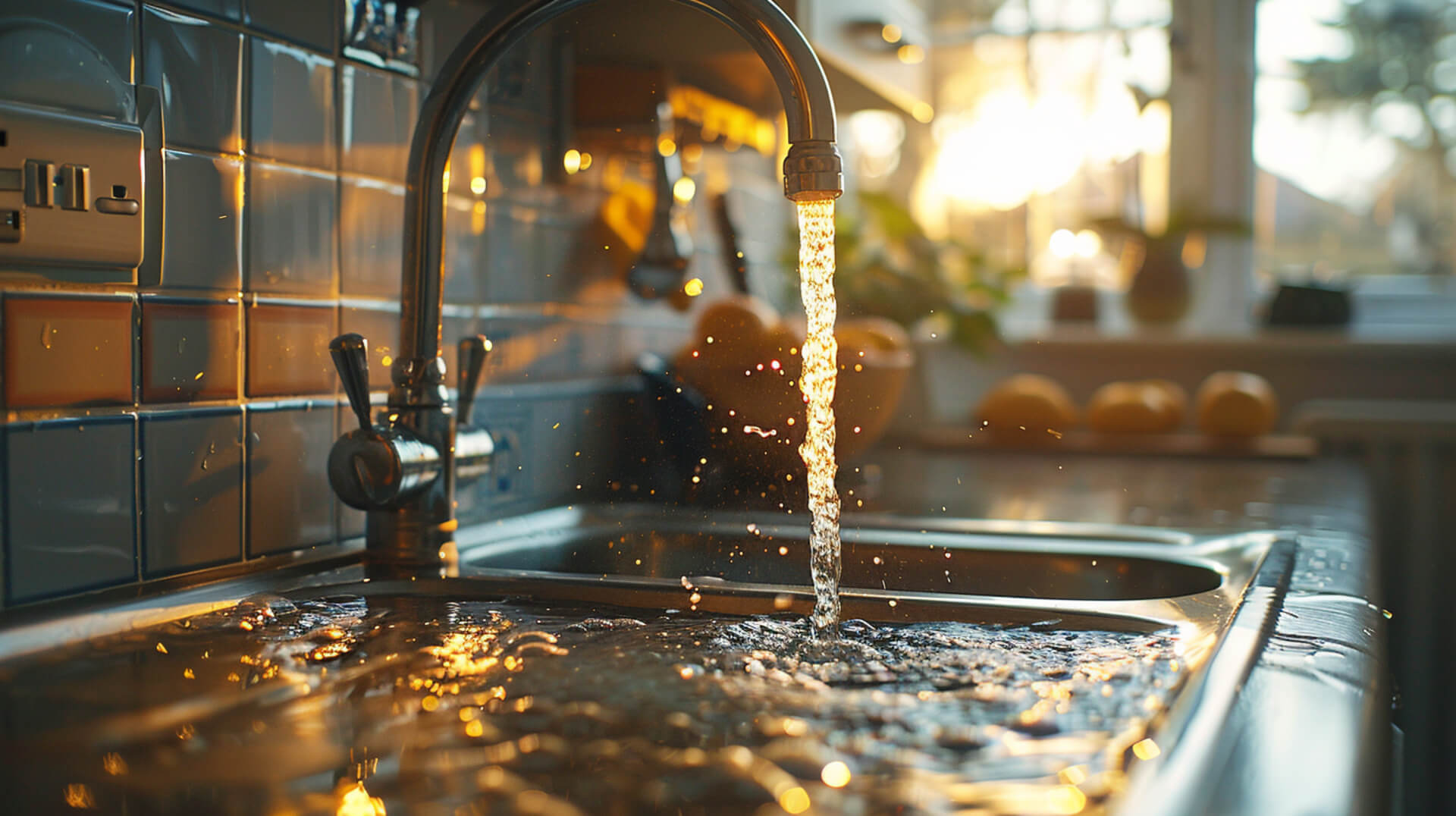
A proactive approach to preventing sink blockages is vital for efficient property management. By anticipating potential issues and addressing them before they escalate, property owners can avoid the inconvenience and costs associated with plumbing emergencies.
Strategies for Improved Property Maintenance
Implementing the strategies discussed, such as regular drain cleaning, proper waste disposal, and the use of protective devices, can lead to a well-maintained property:
- Routine Checks: Regular inspections and maintenance can prevent the buildup that leads to blockages.
- Educational Efforts: Informing tenants and staff about proper sink usage can reduce the likelihood of clogs.
Long-Term Benefits of Blockage Prevention
Consistent sink blockage prevention offers several long-term advantages:
- Operational Continuity: Ensures that plumbing systems function smoothly, preventing disruptions to daily activities.
- Cost Efficiency: Reduces the need for emergency repairs and potential water damage restoration.
Staying Informed on Best Practices
To stay updated on blockage prevention:
- Professional Resources: Consult with plumbing professionals and subscribe to industry publications.
- Online Platforms: Follow relevant blogs, forums, and social media channels for the latest tips and innovations.
- Community Engagement: Participate in workshops or webinars that focus on property maintenance and plumbing care.
By remaining informed and proactive, you can maintain the integrity of your property’s plumbing systems and ensure a comfortable environment for all occupants.
